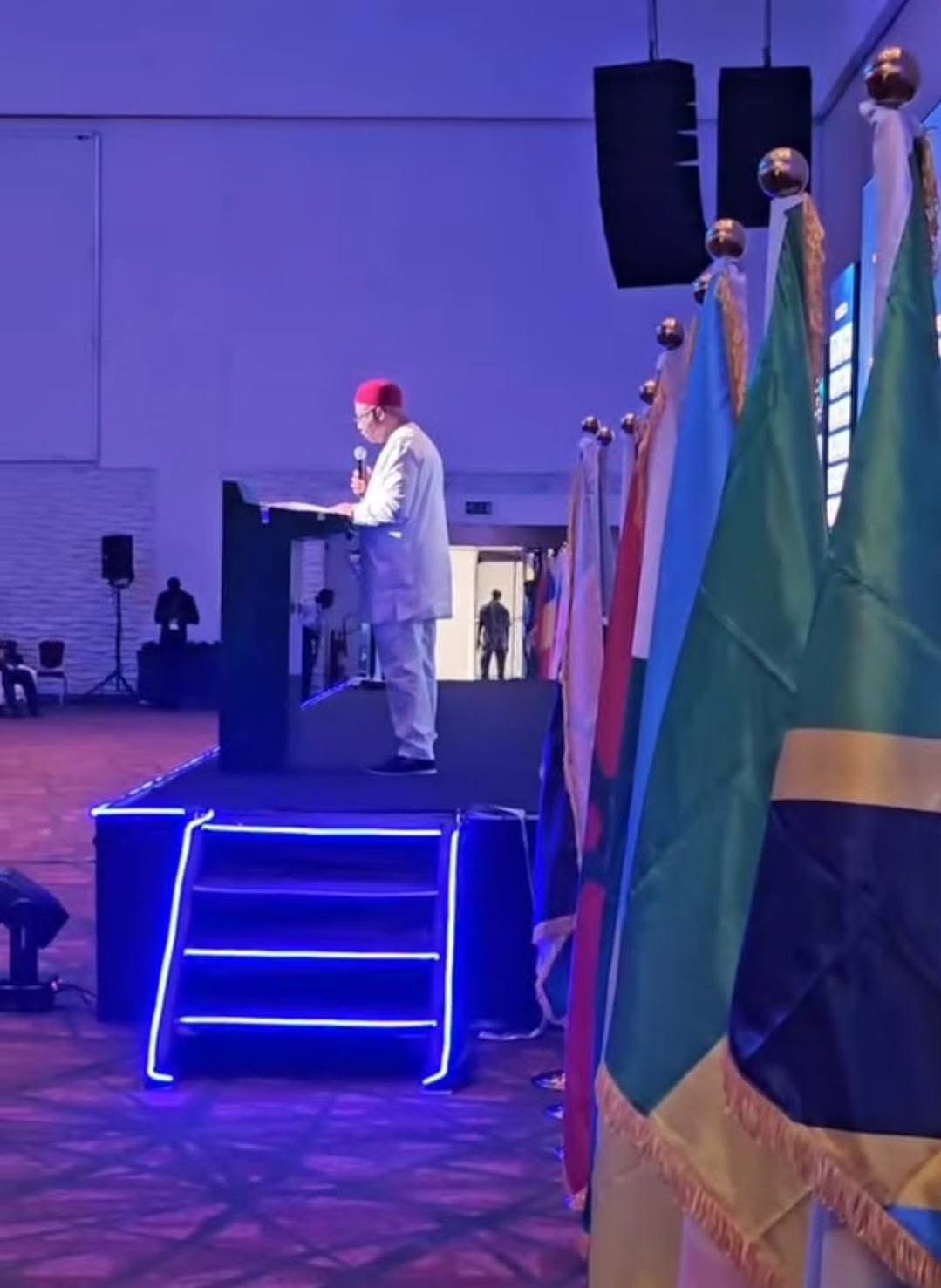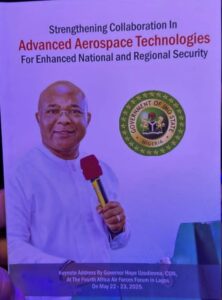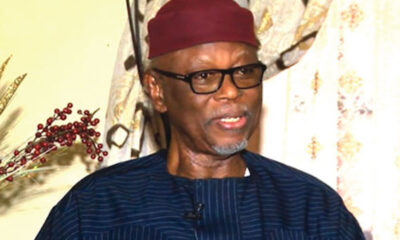News
Strengthening Collaboration In Advanced Aerospace Technologies For Enhanced National and Regional Security Keynote Address By Governor Hope Uzodimma, CON, At The Fourth Africa Air Forces Forum In Lagos, Nigeria.

Strengthening Collaboration In Advanced Aerospace Technologies For Enhanced National and Regional Security

Keynote Address By Governor Hope Uzodimma, CON,
At The Fourth Africa Air Forces Forum In Lagos, Nigeria.
On May 22-23, 2025.
PROTOCOLS
I am deeply honoured to be invited to deliver this keynote address at this high-profile gathering of professionals and aerospace technology experts. This forum is both timely and auspicious.
Let me begin by warmly welcoming all participants,
especially those who have travelled from across Africa and around the world to be part of this historic event. I also bring you the warm greetings of the people of Imo State, who, like many Africans, place great hope in the shared security vision that this forum embodies.
I sincerely commend the foresight and leadership of
Nigeria’s Chief of the Air Staff, Air Marshal Hasan Bala
Abubakar DFS, and his African counterparts for putting this forum together. Your collective resolve inspires confidence in our defence capability as a region.
Airspace defines sovereignty. In today’s world, it also
shapes a nation’s survival. Across Africa, we are being
increasingly confronted by a complex web of transboundary threats, from terrorism and banditry to cyber incursions and resource-based conflicts. Borders or timelines do not confine these challenges. And as the threats evolve, so must our responses, not only in tactical precision but also in collaborative foresight.
We are reminded that airpower remains one of the most versatile tools of modern defence, offering speed, reach, deterrence, and intelligence superiority. However, although some African nations have built impressive capabilities, for example, Egypt has over 1,000 military aircraft, Algeria has 600-plus, and Nigeria maintains 163 aircraft, these numbers alone are insufficient. We need not only more aircraft but smarter integration of our air assets into a collective security architecture.
The Multinational Joint Task Force, which was created in response to the threat of Boko Haram, offers a case in point. Through such joint operations, we have achieved real gains in our efforts to secure our countries. We have neutralised terrorist strongholds, restored communities, and enabled safe resettlement. However, gaps remain in intelligence coordination, operational interoperability, and shared logistics. These must be addressed not in theory but through mechanisms we build together.
That task begins with a hard truth: Africa remains largely dependent on external suppliers for critical aerospace and defence needs. This reliance leaves us vulnerable to both market volatility and strategic manipulation. Yet across the continent, signs of transformation are emerging.
Nigeria’s Defence Industries Corporation is producing
small arms and experimenting with advanced platforms. Private firms like Proforce are manufacturing world-class Mine Resistant Ambush Protected vehicles, already deployed in Chad, Niger, and Rwanda. South Africa has doubled its defence exports since 2020, supplying Africa remains largely dependent on external suppliers for critical aerospace
and defence needs. This reliance leaves us vulnerable to both market volatility and strategic manipulation.
advanced systems and electronic warfare equipment.
Morocco has become a trusted aerospace manufacturing hub, producing for Airbus and other global Original Equipment Manufacturers (OEMs). Egypt and Algeria maintain mature domestic defence industries, while Ethiopia and Zambia have made strides in self-sufficiency and technology integration.
Most notably, at least 35 indigenous drone models are in development or active service across Africa. Nigeria leads in this domain, with 28 drone systems operational or undergoing tests. This is a powerful signal that we are not passive consumers of security technology; we are increasingly becoming architects of our solutions.
But intention must now meet execution. We must
translate our shared aspirations into binding frameworks: mutual defence agreements, co-development pacts, pooled logistics platforms, shared research infrastructure, and joint training protocols. These are not luxuries. In the face
of 21st-century threats, they are necessary instruments of survival.
Increased defence spending ($25 billion in Algeria, $13.4billion in Morocco, $3.1 billion in Nigeria) shows that we are willing to invest. However, we must align these investments with coherent goals. For instance, technology transfer, indigenous innovation, and workforce development. South Africa and Morocco have shown how aerospace progress fuels economic growth and job creation. We must take a cue from these countries.
The leadership of the Nigerian Air Force has adopted a self- reliant approach, reactivating long-abandoned aircraft, deploying locally developed Unmanned Aerial Vehicles (UAVs) like the Tsaigumi, and incorporating academic research into mission planning and systems design. This shift is redefining the scope of African-led innovation in defence.
Distinguished participants, this forum must now bear a new doctrine: an African aerospace doctrine. One rooted in local capacity, governed by shared standards, and fuelled by political commitment. Our continent has the institutions. The African Union and regional economic
“We must translate our shared aspirations
into binding frameworks: mutual defence
agreements, co-development pacts, pooled
logistics platforms, shared research
infrastructure, and joint training
protocols. These are not luxuries. In the
face of 21st-century threats, they are
necessary instruments of survival.”
communities already provide frameworks for collective action. What is left is the courage to act, the will to fund, and the discipline to implement.
The era when air superiority was seen as a privilege is gone. Now, it is a requirement for sovereignty and peace. As we reflect, I urge this distinguished body to move from principles to policies. African skies must not remain exposed and unprotected, and African solutions can no longer wait.
Thank you, and may your deliberations advance the cause of peace, prosperity, and security across our beloved continent.
Sen. Hope Uzodimma, CON
Governor, Imo State of Nigeria.
News
Man in shock after lady he lodged with in a hotel in Abuja flees with his car and other valuables

A Nigerian man is currently in shock after a young lady identified as Precious Chinyere , whom he took to a hotel in the Asokoro area in the FCT for a romantic getaway allegedly fled with his car and other personal belongings on Thursday, February 5,
The distraught man and Precious had visited the hotel and opted for a short time stay. Things took a different in the evening when the man noticed Precious had left the hotel room without notifying him and took along with her some of his personal belongings including phones and laptop and also his car.
The victim immediately reported the incident to the police.
When contacted, the spokesperson of the FCT police command, SP Josephine Adeh, told LIB that the matter is currently being investigated and that efforts are being made to apprehend the suspect.
News
US Reacts As De@th Toll In Kwara Terror Attacks Hits 200

The United States Mission in Nigeria has condemned the k!lling of more than 200 civilians in recent attacks on communities in Kwara State.
Recall that terrorists launched de@dly attacks on Woro and Nuku communities in Kaiama Local Government Area of the state on Tuesday night, k!lling unsuspecting citizens.
It was gathered that the gunmen invaded the villages, opened fire on residents and burned homes.
According to reports, the de@th toll from the unfortunate incident hit 200 on Thursday night.
Reacting, the US Mission Nigeria condemned the k!lling via a post on its official X handle.
The post reads, “The United States condemns the horrific attack in Kwara state in Nigeria, which claimed the lives of more than 160 people, with the de@th toll still unconfirmed and many still unaccounted for.
“We express our deepest condolences to the families of those affected by this senseless violence.
“We welcome President Tinubu’s order to deploy security forces to protect villages in the area and his directive to federal and state officials to provide aid to the community and bring the perpetrators of this atrocity to justice.”
News
“I’ll never settle for a barber, yahoo boy or a poor man” — nail tech’s list of men she says she can’t marry sparks reactions online

A Nigerian nail technician has set social media talking after openly listing the kind of men she says she can never settle for.
In a now-viral post, she stated clearly that she refuses to “settle for less” and went on to mention professions and traits she considers a no-go area.
According to her, she can never settle for a barber, an aza man, a yahoo boy, a mechanic, an actor, a laundry man, a hype man, or a plumber. She also added that she wouldn’t marry a man with a high body count or a poor man.

-
Business1 year ago
US court acquits Air Peace boss, slams Mayfield $4000 fine
-

 Trending1 year ago
Trending1 year agoNYA demands release of ‘abducted’ Imo chairman, preaches good governance
-

 Politics1 year ago
Politics1 year agoMexico’s new president causes concern just weeks before the US elections
-

 Politics1 year ago
Politics1 year agoPutin invites 20 world leaders
-

 Politics1 year ago
Politics1 year agoRussia bans imports of agro-products from Kazakhstan after refusal to join BRICS
-
Entertainment1 year ago
Bobrisky falls ill in police custody, rushed to hospital
-
Entertainment1 year ago
Bobrisky transferred from Immigration to FCID, spends night behind bars
-
Education1 year ago
GOVERNOR FUBARA APPOINTS COUNCIL MEMBERS FOR KEN SARO-WIWA POLYTECHNIC BORI












